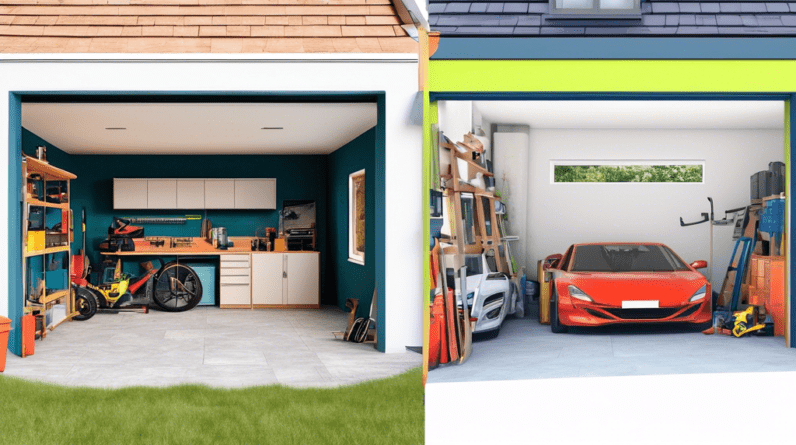
Estimating Your Garage Conversion Costs: A Comprehensive Guide
Understanding the Factors Influencing Garage Conversion Costs
Embarking on a garage conversion project is an exciting way to add valuable living space to your home without the upheaval of a full-scale extension. However, like any home renovation project, it’s crucial to approach it with a realistic budget in mind. The cost of converting your garage can vary significantly depending on a multitude of factors, making it essential to understand the key elements that influence the overall expense.
From the size of your garage and the complexity of your desired transformation to your geographical location and the materials you choose, each factor plays a crucial role in shaping the final price tag. A clear understanding of these elements empowers you to make informed decisions and avoid any unwelcome financial surprises. Let’s delve into the details of each cost factor, providing you with a comprehensive guide to accurately estimating your garage conversion expenses.
1. Size and Scope of the Conversion
The size of your garage is one of the most significant factors affecting the overall cost of your conversion. A larger garage naturally requires more materials and labor to transform, resulting in a higher overall expense. A single-car garage conversion, for example, will typically be less expensive than converting a spacious two or three-car garage.
Beyond the square footage, the complexity of your desired conversion also plays a crucial role. A simple conversion, such as transforming the garage into a functional home office or a cozy guest room, will generally be more affordable than creating a fully equipped living space with a bathroom or kitchen. The addition of plumbing, electrical, and HVAC systems for a more elaborate conversion will significantly impact the overall cost.
2. Location, Location, Location
Geographical location can significantly influence construction and labor costs. Major metropolitan areas or regions with a high cost of living generally have higher labor and material expenses compared to smaller towns or rural areas. Be sure to factor in your local market conditions when estimating your garage conversion costs.
3. Materials and Finishes: Balancing Style and Budget
The choices you make regarding materials and finishes for your garage conversion will directly impact the overall project cost. From flooring and insulation to windows, doors, and fixtures, each element presents a range of options at varying price points.
Opting for high-end finishes, such as hardwood flooring, custom cabinetry, and designer lighting, will naturally increase the overall expense. Conversely, choosing more budget-friendly alternatives, such as laminate flooring, stock cabinetry, and standard lighting fixtures, can help keep costs down without compromising on style and functionality.
4. Structural Considerations and Permits
Depending on the scope of your garage conversion, you may encounter additional costs related to structural modifications and permits. For instance, if your existing foundation requires reinforcement or if you’re adding walls or windows, these structural changes will add to the overall project expense. Permits are typically required for most garage conversions to ensure compliance with building codes and safety regulations, and these fees can vary depending on your location and the complexity of the project.
5. Professional Expertise: The Value of Experienced Contractors
While some aspects of a garage conversion project might seem like suitable DIY endeavors for skilled homeowners, it is generally advisable to enlist the services of experienced professionals, such as contractors, electricians, and plumbers, to ensure the project is completed safely, efficiently, and to code. The cost of labor will vary depending on your location, the complexity of the conversion, and the rates charged by the professionals you hire.
When selecting contractors, it’s essential to obtain multiple quotes to compare pricing and services. Request detailed breakdowns of labor and material costs to make informed decisions. Remember that choosing a reputable and experienced contractor, while potentially costing more upfront, can save you money in the long run by minimizing the risk of costly errors or delays.
6. Hidden Costs: Planning for the Unexpected
Even with meticulous planning, unforeseen expenses can arise during any home renovation project, and garage conversions are no exception. It’s crucial to factor in a contingency fund to cover these unexpected costs, which might include:
- Unforeseen structural issues discovered during demolition
- Hidden electrical or plumbing problems requiring repair
- Delays in material deliveries or unexpected price increases
- Changes to the original design plan
Setting aside a contingency fund of 10% to 20% of your total budget can provide a financial cushion to handle these unexpected expenses and ensure your project stays on track.
7. DIY vs. Hiring a Professional: Weighing the Pros and Cons
While tackling some aspects of a garage conversion yourself can potentially save on labor costs, it’s essential to carefully weigh the pros and cons before taking the DIY route. Projects involving complex electrical work, plumbing, or structural changes are best left to licensed professionals to ensure safety and code compliance.
DIY projects require a significant investment of your time and effort. Factor in the cost of tools and equipment, as well as the potential for costly mistakes if you lack experience in a particular area. If you do decide to tackle certain tasks yourself, choose projects that align with your skillset and comfort level, leaving the more complex aspects to the professionals.
8. Budgeting Tips for Your Garage Conversion
Accurately estimating and managing your garage conversion costs is essential for a successful and stress-free renovation experience. Here are some valuable budgeting tips to guide you through the process:
- Thorough Research and Planning: Invest ample time in researching different conversion options, materials, and labor costs in your area. Gather inspiration from online resources, home improvement magazines, and visit local home shows to get a realistic sense of current market prices.
- Obtain Multiple Quotes: Contact several reputable contractors in your area and request detailed quotes for your project. This will provide a range of pricing options and help you identify any discrepancies or inconsistencies.
- Prioritize Your Spending: Allocate your budget wisely by prioritizing essential elements over purely aesthetic upgrades. Focus on structural integrity, insulation, and energy efficiency, which will provide long-term value and comfort.
- Explore Financing Options: If needed, investigate various financing options, such as home equity loans, personal loans, or government programs that might be available to assist with home improvement projects.
Conclusion: Creating a Functional and Valuable Space
Converting your garage into a functional and valuable living space is a wise investment that can enhance your lifestyle and increase your property value. By understanding the key factors that influence garage conversion costs and following these practical tips, you can confidently embark on this exciting home improvement journey.
Remember, thorough planning, realistic budgeting, and the right team of professionals are the keys to a successful and rewarding garage conversion experience.






